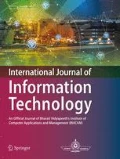Abstract
This paper proposes an innovative approach in sensorless speed control of induction motor which easily fixes the system at lower cost with high reliability. The conventional Model Reference Adaptive System (MRAS) approach is usually built on the model of voltage and flux linkage in which the accuracy of the speed estimation is affected by the deviations in stator parameters. In the proposed modified MRAS method, to avoid the impact of motor quantities on the performance of speed calculation. Imaginary power in fixed coordinate without speed information is used in the reference model and the imaginary power in the revolving coordinate contains the speed data. The proposed method developed in the MATLAB/Simulink environment and simulation results shows the accuracy and reliability of the speed estimation under the various running conditions.









Similar content being viewed by others
References
Ben-Brahim L, Tadakuma S (1998) Speed control of induction motor without rotational transducers. In: Conference Record of 1998 IEEE Industry Applications Conference. Thirty-Third IAS Annual Meeting vol. 1, pp 625–632
Zhang G, Wang G, Xu D, Yu Y (2017) Discrete-time low-frequency-ratio synchronous-frame full-order observer for position sensorless IPMSM drives. IEEE J Emerg Sel Top Power Electron 5:870–879
Chen W, Yu Y, Yang R, Xu Z, Xu D (2010) Low speed stability research of adaptive full-order observer for induction motor. Proc CSEE 30:33–40
Orlowska-Kowalska T, Dybkowski M (2010) Stator-current-based MRAS estimator for a wide range speed-sensorless induction-motor drive. IEEE Trans Ind Electron 57:1296–1308
Sheela M, Himavathi S, Santhalakshmy S, Venkadesan A (2014) Comparison of flux and real power based MRAS for inverse Rotor time constant estimation in induction Motor Drives. In Proceedings of the 2014 International Conference on Advances in Electrical Engineering (ICAEE), Vellore, India, 9–11 January 2014; pp 1–5
Han D, Zhang Y (2019) The Speed estimation based on MRAS Induction motor. In 2019 IEEE 3rd Advanced Information Management, Communicates, Electronic and Automation Control Conference (IMCEC), 2019, pp 814–817
Wubin K, Jin H, Ronghai QU, Min KA, Jian LI (2016) Research on speed sensorless control strategies for five-phase induction motors with rotor parameter estimation. Proc CSEE 36:532–539
Rashed M, Stomach AF (2004) A stable back-EMF MRAS-based sensorless low-speed induction motor drive insensitive to stator resistance variation. IEE Proc Electr Power Appl 151:685–693
Peng F, Fukao T (1994) Robust speed estimation for speed-sensorless vector control of induction motors. IEEE Trans Ind Appl 30:1234–1240
Malti S, Chakraborty C, Hori Y, Ta MC (2008) Model reference adaptive controller-based rotor resistance and speed estimation techniques for vector controlled induction motor drive utilizing reactive power. IEEE Trans Ind Electron 55:594–660
Malti S, Chakraborty C (2009) Experimental validation of very-low and zero speed operation of a flux-eliminated adaptive estimator for vector controlled IM drive. In Proceedings of the 2009 IEEE International Conference on Industrial Technology, Churchill, Australia, 10–13 February 2009; pp 1–6
Ganjewar SP, Pahariya Y (2021) Novel approaches in sensorless induction motor drive for industrial applications. Turkish J Comput Math Educ 12(10):7438–7447
Kumar R, Das S, Chattopadhyay AK (2015) Comparison of Q- and X-MRAS for speed sensor less induction motor drive on. Michael Faraday IET International Summit 2015:319–324
Bao D, Wang H, Wang X, Zhang C (2018) Sensorless speed control based on the improved Q-MRAS method for induction motor drives. Energies 11:235
Kanagasabai L (2021) Real power loss reduction by percheron optimization algorithm. Int J Inf Technol 13(1):1089–1093
Benlaloui I, Drid S, Chrifi-Alaoui L, Ouriagli M (2015) Implementation of a new MRAS speed sensorless vector control of induction machine. IEEE Trans Energy Convers 30:588–595
Yadav AK, Saxena P, Gaur P, Pathak PK (2021) Self tuning fuzzy PID controller for servo control of hard disk drive with time delay. Int J Inf Technol 13(1):109–114
Khan H, Khatoon S, Gaur P (2021) Comparison of various controller design for the speed control of DC motors used in two wheeled mobile robots. Int J Inf Technol 13(2):713–720
Author information
Authors and Affiliations
Corresponding author
Rights and permissions
About this article
Cite this article
Ganjewar, S.P., Pahariya, Y. Modified MRAS approach for sensorless speed control of induction motor for reliability improvement. Int. j. inf. tecnol. 14, 1595–1602 (2022). https://doi.org/10.1007/s41870-021-00847-z
Received:
Accepted:
Published:
Issue Date:
DOI: https://doi.org/10.1007/s41870-021-00847-z




